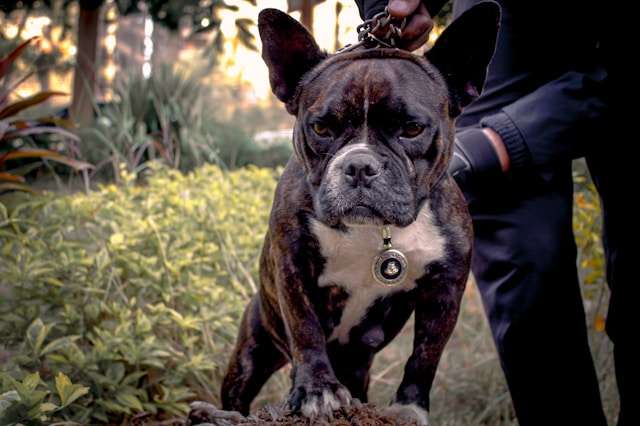Best Dog Food Options for Boston Terriers in 2024

Boston Terriers may be small, but their dietary needs pack a punch. With their sensitive stomachs and tendency for food allergies, finding the right dog food is essential.
Choosing a diet that matches their unique build and energy level can promote long-term health and happiness. In this post, we’ll cover the top options and what makes them the best choice for your Boston Terrier.
Table of Contents
Understanding Boston Terriers’ Nutritional Requirements
Boston Terriers are small yet spirited dogs with unique dietary needs. Knowing what fuels their health can make all the difference in their quality of life. Let’s dig into what’s essential for their nutrition and how diet ties into their overall well-being.
Essential Nutrients for Boston Terriers
Like all dogs, Boston Terriers rely on a balance of essential nutrients to stay healthy and active. However, their compact build and sensitive stomachs demand a bit more precision. Here’s what they need:
Protein: A primary source of energy and muscle maintenance. Look for high-quality animal proteins like chicken, lamb, or fish. Aim for a formula where protein constitutes around 22-25% of the diet. Check this guide on feeding Boston Terriers for protein insights.
Healthy Fats: Fats are vital for energy and a shiny coat. Omega-3 and Omega-6 fatty acids support their skin, helping prevent common issues like dryness or allergies.
Carbohydrates: While Boston Terriers don’t need large amounts of carbs, whole grains or vegetables can provide fiber for digestion. Sweet potatoes and brown rice are excellent choices.
- Vitamins and Minerals: These are the unsung heroes of their diet. Calcium supports bone health, while antioxidants like vitamins A and E strengthen the
immune system.
Water: Don’t underestimate hydration. Fresh water helps digestion and prevents urinary issues common in smaller breeds.
Common Health Issues Related to Diet
Poor diet choices can lead to several health problems for Boston Terriers. Switching to a balanced, high-quality diet can mitigate or prevent these issues. Here’s a closer look:
- Allergies: Many Boston Terriers are prone to food allergies. Common culprits include grains, chicken, or dairy. Symptoms may be
Itchy skin, ear infections, or even digestive upset. A limited-ingredient or grain-free diet may help. Learn more about managing their allergies here.
Obesity: Despite their small size, Boston Terriers love to eat and can quickly gain weight. Obesity puts undue strain on their joints and can lead to more severe conditions like diabetes. Portion control and regular exercise are essential to keep them healthy.
Digestive Issues: Their sensitive stomachs make them prone to gas and bloating. High-quality kibble with probiotics can improve digestion. Avoid artificial additives and fillers that may worsen the issue.
Dental Health: While not entirely diet-related, kibble size and texture play a role in dental hygiene. Look for specially formulated kibble that promotes chewing and reduces the risk of plaque buildup.
Taking a proactive approach to feeding ensures that your Boston Terrier stays lively and healthy while avoiding common pitfalls. Need more on health conditions Boston Terriers face? Check out this resource on their common health problems.

Photo by Sean Brannon on Pexels
Best Dog Food Brands for Boston Terriers
Boston Terriers need food tailored to their compact size, active lifestyle, and sensitive tummies. Choosing the right brand sets the foundation for their long-term health. Below, we’ve reviewed some of the best options for feeding your Boston Terrier.
Purina Pro Plan Small Breed: Explore the formulation, benefits, and customer reviews
Purina Pro Plan Small Breed is crafted with small dogs in mind. Its chicken and rice formula is a hit for Boston Terriers, offering high-quality protein for muscle support and prebiotic fiber for digestive health. This blend is especially appealing for picky eaters thanks to its palatable flavor.
- Benefits:
- Includes high-protein content for energy.
- Features probiotics to support gut health.
- It is designed to promote lean muscles and shiny coats.
Customer reviews rave about its impact on dogs with sensitive stomachs. Many report reduced gas and improved eating habits. For a detailed breakdown of this formula, check Purina Pro Plan Review.

Photo by Sean Brannon on Pexels
Royal Canin Breed Health Nutrition: Highlight specific ingredients and how they cater to Boston Terrier needs
Royal Canin’s formulas are engineered for breed-specific needs. Though they don’t have a Boston Terrier-specific line, their trim breed options deliver exceptional support to these dogs. The kibble shape encourages chewing, preventing tartar buildup—an issue many Boston Terriers face.
- Key Ingredients:
- Animal proteins for muscle health.
- EPA and DHA fatty acids for skin and coat care.
- Enriched with antioxidants to boost immune health.
Boston Terrier owners frequently praise this food for improved digestion and energy levels. Learn more about its tailored benefits here.
Hill’s Science Diet for Small Breeds: Discuss the science behind the formulation and its health benefits
Backed by decades of research, Hill’s Science Diet is recognized as a scientifically sound choice. Their small breed formulation targets digestive and skin sensitivities, making it ideal for Boston Terriers.
- Notable Features:
- Includes omega-6 fatty acids and vitamin E for a healthy coat.
- Formulated with natural fibers for optimal digestion.
- Made with no artificial flavors or preservatives.
Many pet owners appreciate its balance between taste and nutrition, reporting fewer allergy flares and healthier fur. Discover how it supports your dog’s health through this Hill’s Science Diet review.
American Natural Premium: Emphasize its suitability for dogs with allergies
American Natural Premium focuses on simplicity, offering recipes with limited ingredients perfect for Boston Terriers prone to allergies. Designed to be allergen-free, it caters to pets with food sensitivities.
- Why It’s a Great Choice:
- Free from common allergens like corn, soy, and wheat.
- Includes probiotics to support digestion and immunity.
- Boasts natural proteins and fats for sustained energy.
Dog owners with allergic pets often see dramatic improvements, particularly in skin health and reduced itching. Curious about its benefits for your pup? Find out more here.
Eagle Pack Original Chicken Meal and Pork Meal: Review its affordability and nutritional value
Eagle Pack combines affordability with premium nutrition, making it an accessible choice for budget-conscious pet owners. Its protein-rich formula supports energy, while natural ingredients ensure balanced nutrition.
- Features That Stand Out:
- High protein levels from chicken and pork meal.
- Packed with essential vitamins and minerals.
- No artificial enhancers or fillers.
This brand is praised for maintaining quality at a lower price point. Owners love its effect on energy levels and coat health. Check out more details on their offerings here.
Each of these brands has a unique strength that can address the specific health concerns of Boston Terriers. Whether your pup struggles with allergies, digestion, or maintaining a healthy weight, there’s a top-tier option to suit their needs.
- Key Takeaways & Next Steps
Choosing the right dog food for your Boston Terrier ensures health and happiness. Remember to consider their unique size and activity level. Explore more tips and advice by visiting Are Boston Terriers Good Dogs? A Comprehensive Look 2024. - Focus on Nutrition
Proper nutrition is essential for Boston Terriers to thrive. High-quality food tailored to their needs makes all the difference. Learn more about maintaining a balanced diet in our Nutrition Tips section. - Health & Longevity
The best dog food supports long-term health for your Boston Terrier. It helps prevent common issues while keeping energy levels high. Discover more food options in our Dog Food Category. - Engage Your Knowledge
Your Boston Terrier’s food is a big part of their well-being. Share your experiences or questions below and check out our guide: Dog Breed Guide: Find Your Perfect Companion.
Best Dog Food Options for Boston Terriers in 2024: FAQ
What are the top ingredients Boston Terriers need in their diet?
Boston Terriers thrive on high-quality protein, healthy fats, and essential vitamins. Look for formulas including chicken, beef, or fish and added omega-3s and fiber. Avoid fillers and by-products.
Should I choose grain-free food for Boston Terriers?
Not necessarily. While some Boston Terriers have grain sensitivities, many tolerate grains like brown rice and oatmeal well. Consult your vet if you’re unsure.
How do I manage allergies in my Boston Terrier’s diet?
Opt for limited ingredients and hypoallergenic dog foods. These often feature single protein sources and no common allergens.
See this comprehensive guide for more on managing dog diets with potential allergies.
Can Boston Terriers eat raw food diets?
Yes, but it comes with risks. Select commercial raw diets from trusted brands or consult your vet to ensure a balanced meal plan.
How often should I feed my Boston Terrier?
Feed adult Boston Terriers twice a day. Puppies may need three to four small meals daily to support their growth and energy levels.
Are certain brands better for Boston Terriers?
Choose brands focused on small breeds with tailored formulas. Popular options include Royal Canin, Wellness, and Purina Pro Plan.
Learn more about breed-specific needs in the dog breed guide.
How can I maintain a healthy weight for my Boston Terrier?
Use portion control and low-calorie treats. Opt for light or weight management dog food for less active dogs.
Explore ways Boston Terriers thrive at this resource.
Are human foods safe for Boston Terriers?
Some are! Small amounts of green beans or sweet potatoes are acceptable. Avoid chocolate, onions, and anything high in sugar or salt.
Is wet or dry food better for Boston Terriers?
Dry kibble is excellent for dental health, but a mix of wet and dry food can improve palatability and hydration.
When should I switch my Boston Terrier from puppy food to adult food?
Transition around 12 months of age. Monitor their weight and activity level to adjust gradually.
Check the dog breeds list for detailed breed feeding practices.







2 Comments